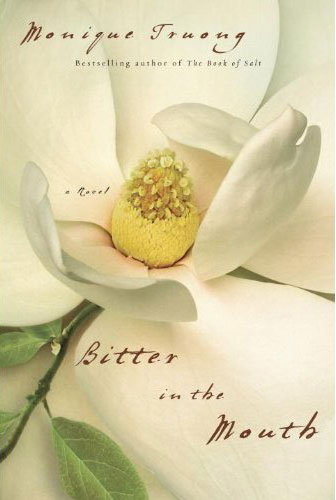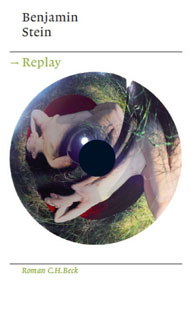 ••• Gestern erschien in den USA »Bitter in the Mouth« von Monique Truong, die englische Originalausgabe von »Bitter im Mund«, deutsch erschienen bereits im Frühjahr bei C.H.Beck. Dieser Roman hat mich in nachhaltige Begeisterung versetzt. Zu den Vattenfall-Lesetagen in Hamburg wäre ich Monique Truong um ein Haar persönlich begegnet. Leider machte uns der isländische Vulkan mit dem unaussprechlichen Namen einen Strich durch die Rechnung. Monique konnte aus den USA nicht anreisen. Per Mail allerdings haben wir uns seither ausgetauscht.
••• Gestern erschien in den USA »Bitter in the Mouth« von Monique Truong, die englische Originalausgabe von »Bitter im Mund«, deutsch erschienen bereits im Frühjahr bei C.H.Beck. Dieser Roman hat mich in nachhaltige Begeisterung versetzt. Zu den Vattenfall-Lesetagen in Hamburg wäre ich Monique Truong um ein Haar persönlich begegnet. Leider machte uns der isländische Vulkan mit dem unaussprechlichen Namen einen Strich durch die Rechnung. Monique konnte aus den USA nicht anreisen. Per Mail allerdings haben wir uns seither ausgetauscht.
Als ich nun gestern auf Facebook ihre Ankündigung der US-Ausgabe las, habe ich forsch gefragt, ob sie sich vorstellen könnte, für den Turmsegler einen Gastbeitrag zum Thema Erinnerung zu schreiben, dem Thema also, das ihr aktuelles mit meinem aktuellen Buch verbindet. In Monique Truongs Roman dreht sich alles um Worte und den Geschmack, den die Heldin Linda jeweils mit ihnen verbindet. Aus den Worten und aus Geschmackssensationen steigt bei dieser Heldin die Erinnerung auf. So hatte ich – da ich gerade im Urlaub ein gutes Stück Proust gelesen habe – die vage Hoffnung, Monique würde vielleicht etwas über die in Lindenblütentee getauchten Madeleines schreiben. Stattdessen hat sie mir eine Geschichte geschickt, in der es auch um Geschmackserinnerungen geht. Aber lest selbst.
An Monique Truong einen herzlichen Dank und beste Wünsche für das neue Buch. Wenn ihr mehr solche Geschichten von ihr lesen wollt, empfiehlt sich ein Besuch der neuen Website, auf der sie einige davon, im Laufe der letzten Jahre für Zeitungen, Zeitschriften und Websites geschrieben, zusammengestellt hat.
My memories have always been sealed with a taste. I remember people, places, events by the foods that I consumed while in their presence or in their geography. In April of 1975, when I was six years old, I was at an army base in California called Camp Pendleton. It had been turned into a refugee camp, and my mother and I were among the thousands of Vietnamese assigned to its hastily set up tents. Each one, each canvas A-frame deployable structure was a site of loss. Being human and being Vietnamese—we who say »have you eaten?« when we mean »how are you?«—we, the inhabitants of this camp, tried to fill our emptiness by keeping our stomachs full. Food was provided to us from the back of truck beds. The lines were always long. Some lines lead to chicken, which was popular. Some lead to unidentifiable masses covered in cheese, which were not popular. Some lead to apples. There were also oranges, and bananas always emptied the tents. In my family, which had grown suddenly so small, I was the gatherer. I stood in line for my mother, but she ate little of what I brought back, except for the fruits. One night, in some fit of desperation and madness and probably hunger, she sent me to the camp’s Officers’ Club with a note and a twenty dollar bill. I can’t remember how I made my way to the building, which was, of course, off limits to us refugees. I can’t remember to whom I handed the note. Nor how long it took or what I did while I was waiting. I don’t remember whether I got any change back. I do remember returning to the tent with a paper bag, that inside there were foil packets, and that they were warm. I remember eating with my mother our first real meal in the United States: hamburgers and fries. How could the truth be such a cliché? This memory is buried so deep in me that when it does emerge it is always a surprise to me. I have to ask myself each time, could that have really happened? Then, I think about that note. What did my mother write? Was it formal and business like—the way that English can often be when the writer acquired it in a faraway country: »Dear Sir-or-Madam. Please, we would like to place an order.« Or was it stark and clear in the way that grief can strip us all of artifice: »I am thirty-one years old, and I have a twenty dollar bill, and I have one child. Please take the money. Please send the child back to me along with the food. P.S., where is my husband?« Whatever my mother wrote that night, they were the first English words to feed me. That note, the persistence of it in my memory, the taste that it still serves forth, and the speculation of what it could have said are the reasons why it will always be the beginning of the story for me.
© Monique Truong (2010)






Am 2. September 2010 um 01:09 Uhr
Meine englische Ausgabe ist auch schon unterwegs. Oder vielleicht schon angekommen?
Bin gespannt.
Am 2. September 2010 um 22:07 Uhr
wunderbar!!!